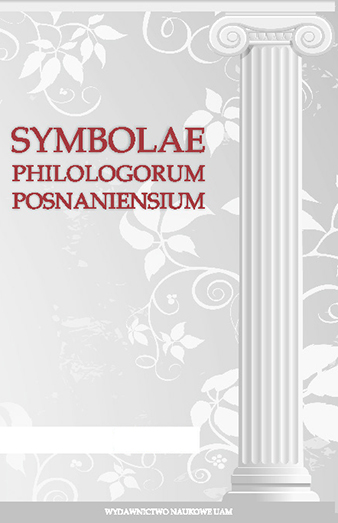Grecka nazwa ślimaka σέσῑλος i jej indoeuropejska geneza
The Greek name for ‘snail’, σέσῑλος, and its Indo-European origin
Author(s): Krzysztof Tomasz WitczakSubject(s): Applied Linguistics
Published by: Uniwersytet Adama Mickiewicza
Keywords: etymology; Greek dialectology; Hesychius of Alexandria; snail.
Summary/Abstract: The author discusses three Ancient Greek names for ‘snail with a spiral shell’: (1) σέσῑλος, (2) σέσηλος and(3) σέσελις (gen. sg. σεσέλιτος). It is suggested that the first name σέσῑλος is of Ionic origin (with the regular representation of the diphthong ει as ῑ), the second one σέσηλος belongs to the Doric heritage (see the Laconiangloss in Hesychius’ lexicon: σέσηλοι· κοχλίαι. Λάκωνες), and the third σέσελις represents a purely Attic form.The Proto-Greek archetype should be reconstructed as *σέσελϝος (m.) ‘snail’. In fact, the disappearance of theglide *ϝ in the Ancient Greek dialects causes the lengthening of the original vowel *ε to ει (later ῑ) in Ionic,to η in Doric. Only the Attic dialect preserves the short vowel ε with no change, see e.g. Ionic ξεῖνος, Doricξῆνος, Attic ξένος (m.) ‘guest-friend; guest; stranger, foreigner, refugee’ < Proto-Greek *ξένϝος, see Myc.Gk. ke-se-nu-wo [ksenwos], Aeolic ξέννος, Corcyrean πρόξενϝος (m.) ‘public guest, deputy’. The archetype*σέσελϝος was created as a reduplicated form of the Indo-European verbal root *tsel- ‘to creep, crawl’, cf. OldIndic (Vedic) tsáru- m. (u-stem) ‘a crawling animal’ (< IE. *tsélus m. ‘snail’). A related term with no reduplicationis attested in the Hesychian glossary (σ-374): σελάτης· κοχλίας, as well as in the Celtic languages, e.g.[1] MIr. selide ‘snail’, Mod. Ir. seilide, seilchide, seilmide, slimide ‘id.’ (< Celtic *selantī- < IE. *tsel-n̥t-ī); [2]OIr. selige m. (gl. testudo) ‘tortoise’, MIr. seilche ‘tortoise; snail’, Scottish Gaelic seilcheag ‘snail’ (< Celtic*selaki̯ās < IE. *tselə2ki̯ās).
Journal: Symbolae Philologorum Posnaniensium Graecae et Latinae
- Issue Year: XXVII/2017
- Issue No: 1
- Page Range: 53-67
- Page Count: 15
- Language: Polish

